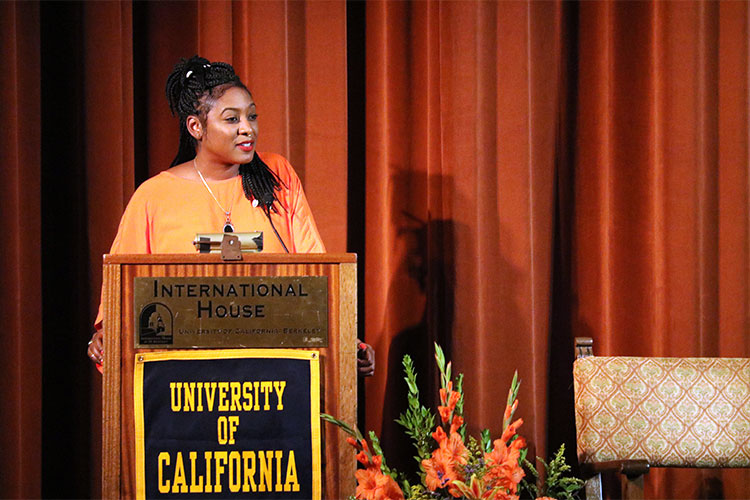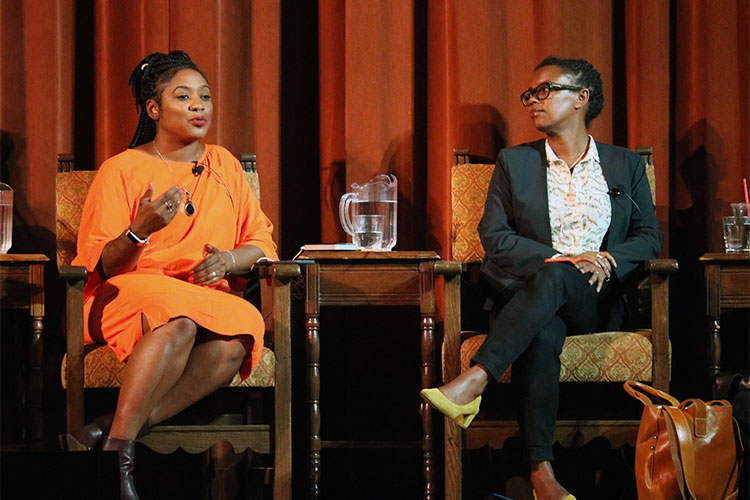Black Lives Matter leader: ‘In the fight of our lives against fascism’
In the fight against fascism, we need every tool we can get, says BLM leader Alicia Garza.
October 6, 2017

Alicia Garza spoke to a rapt audience at International House on Tuesday. (UC Berkeley photo by Kirpa Singh)
Alicia Garza, a cofounder of the Black Lives Matter organization, came to Berkeley Thursday night “to rant for a minute” before settling into a somber talk about BLM today and the urgent need to fight threats ranging from fascism and extra-judicial racial terror to white supremacy.
She drew a full house to the Chevron Auditorium at International House, where she was a guest of UC Berkeley’s Department of Gender and Women’s Studies.
Black Lives Matter came into the public consciousness as a hashtag after the slaying of Trayvon Martin in Florida in 2012, and the organization turned into a movement after the murder of Michael Brown in Ferguson, Mo., in 2014. Today, BLM is a decentralized but active network across the United States and the United Kingdom, in Ghana and in other countries.
“Black Lives Matter is not a trend,” said Garza, an Oakland resident and special projects director for the National Domestic Workers Alliance.
She noted that arrests of those who continue to protest the deaths of blacks at the hands of police continue, even if CNN or other mainstream media outlets no longer find the actions suitable for nightly newscasts or if they intentionally block such coverage.
In fact, 143 people were handcuffed and placed in police vans Tuesday night in St. Louis after protesting the acquittal of a police officer in the 2011 shooting death of young black man.

UC Berkeley student Kimberly Burke listens attentively as BLM co-founder Alicia Garza speaks. (UC Berkeley photo by Kirpa Singh)
Garza acknowledged a complex and challenging scene in the United States today, one where the threat of nuclear war with North Korea looms, natural disasters are dramatically exacerbated by the lack of human intervention and the American president appears stunningly hesitant to call out white supremacy.
“I’m terrified of what is happening in our country,” she said. The Trump administration, she said, seems intent on promoting a white, Christian and heteronormative-dominant society that censors and represses other realities.
She observed that the San Francisco Bay Area has experienced a tense year as a long lineup of conservative and right-wing leaders — such as Milo Yiannopoulos, Ann Coulter and Ben Shapiro — have spoken at Berkeley or made efforts to do so.
Garza cautioned her listeners to not dismiss them as harmless, quirky “characters.” She reminded them that a young woman was mowed down by a Nazi sympathizer driving a truck with a Confederate flag in Virginia after a rally led by clean-cut-looking young white men dressed in white polo shirts and carrying tiki torches.
The latest battle for the bullhorn has upended the concept of free speech, Garza said, and “boxed us into the tiniest corner possible” where the only option appears to be free speech that includes violent hate speech.
People are now “stuck” having to let people say whatever they want to say, although she quipped — sort of — that is true only for white people. “I can’t say whatever I want,” Garza said, adding that if she does, she can expect to have an FBI agent rapping on her door.
“In a fight against fascism, we need every tool we can get,” said Garza, adding that she recognizes many oppose the tactics — if not the goals or intent — of anti-fascist groups that turned out to challenge Nazis and other of their ilk from Virginia and Boston to Berkeley.
Although it may seem that the battle against normalizing the wild tweets, comments and spectacle of Donald Trump is being steadily undermined, Garza called for determined resistance “at all points and places.”
While many resisters report a deep exhaustion or weariness, she said the Trump administration is forging ahead with plans to essentially dismantle government, undermine public sector unions, destroy the Affordable Care Act, rip apart women’s health protections and more.

Alicia Garza (left) fielded questions from a faculty panel that included Leigh Raiford, an associate professor in African American studies (right). (UC Berkeley photo by Kirpa Singh)
Upcoming elections need to do more than move pieces on the chess board, Garza said.
“We need new leaders,” she said, adding that the 2020 presidential election will not offer up anything close to a ride on an idyllic Freedom Train.
“The world is a hard place to be in right now,” Garza said
“When black lives matter, all lives matter,” she said, lamenting that the “agenda of this regime is to take us all out.”
“I’m calling on us to do better, because I believe our lives depend on it and because we deserve better,” Garza said.
Her appearance was co-sponsored by UC Berkeley’s Center for Race and Gender, the Multicultural Community Center, the Division of Equity and Inclusion, the Graduate Assembly and the departments of African American studies and of ethnic studies.
A panel that included Paola Bacchetta, a professor in gender and women’s studies; Raiford; and Russell Robinson, the Distinguished Haas Chair in LGBT Equity and professor of law, followed up Garza’s address with questions.